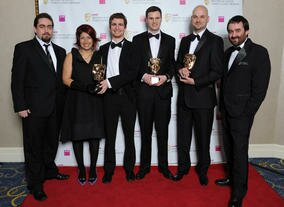
Browser games are relatively new in this industry. It is only over the past decade that their true potential has been unlocked and games developers have now started to take them seriously.
I got a chance to speak with Roberta Lucca, Henrique Olifiers and Michael Bithel, of Bossa Studios. The team won the award for Best Browser Game. During my time speaking with the trio I was struck by how honoured they felt receiving this award and the love they had for their games and community.
(M= Media, RL= Robert Lucca, HO= Henrique Olifiers and MB= Michael Bithel)
M: Congratulations on your award. What does it mean to you?
MB: I know I said this before. As you can tell from the accent I’m not English. I’ve always admired the English culture, every aspect of it, especially gaming and I walk up on stage and Ian Livingstone comes to me and says “congratulations”. I mean, even being in the same room as you [Ian Livingstone] is amazing and to be recognised and be able to contribute towards the culture of gaming as a whole is a huge honour and I’m utterly speechless.
RL: I think for us we want to thank our community and fans. I mean we are a one year old studio and it’s our first game and having such an amazing community already behind us and already so engaged with our products is unbelievable. Being recognised for that is almost like we want to give it back and say thank you to the guys [community].
HO: If you look at the people on the panel who judged us right, these are people who made games which inspired me to become a game developer. To know that these guys played the game is enough for me, but knowing that they elected it as the best one they played – what else can I wish for right?
M: Was browser-based games the way you wanted to develop or was it just accessible for starting up?
HO: I think that what browser games can do like no other platform, is put us in touch with the players on a daily basis. Every decision and design feature we put in the game, we can get feedback from the players. We always know if we got it right, or if we screwed it up. So it’s completely different to working two or three years on something and just publishing it because after two or three years you are a different person. You don’t even know why you made those decisions anymore. So the learning process of having the game live and being able to push content so fast, you can only achieve through browser. We are not just browser either. We are social games. We are on a platform where we are connected to friends. Those friends are the people in the world who matter most to you. When you play with them the kind of engagement and emotions that flare up are completely different and that helps the game to be more enjoyable.
MB: I would say that we started our business about a year ago and that was a time when we almost had to apologise for being browser-based. Now I think it is changing. The games coming out today are better and better. I am amazed at the quality of games coming out. Our game recognised there is fantastic. I absolutely think that this is already a leading platform.
M: A year is a relatively short time to be around. Who would you consider your direct competition to be or are you trying to just make the best product you can?
RL: The best product. We are about being led by creativity and innovation. Games for gamers. Obviously there is competition out there and there are some big guys. For us our monetization comes after you really create something that people enjoy. Social networking is something that allows us to do that and in the near future all the touch devices and mobile devices will allow us to bring new experiences to players.
HO: Monstermind is the first real-time PvP game on the platform. There are new games coming now, but we were the first. Before social interaction was, “give me a cow and I’ll give you this or this.” Now in Monstermind you have a city of friends that can launch monsters against you and they raise your city to the ground if you suck at defending it right. That’s really a meaningful impact you have on someone else and that’s how you really create a social experience.
RL: It’s very much a social game.
HO: Our next game on the platform is the first one which is fully 3D, still on Facebook. With a quality that you have never seen before. We have Yoshifusa Hayama on the team. He is famous for The Last Guardian, Ico, Shemnue. So he is one of the heavyweights in the industry taking care of our game. So you can see how seriously we take this. We want to bridge the gap between social games and consoles. Two years from now we want you to play one of our games and say “Yeah, I could be playing that on Playstation 3.”
M: So you are really aiming for that AAA status then?
HO: Yeah. The production values yes, but the game design will always be about the multiplayer social. It’s different from other multiplayer because that’s with players you often don’t know, like in MMO’s, or chat rooms, this is about people you really care about.
M: Do you think the input from your customers drives your business?
HO: That is the one thing we cannot lose. We need to stay in touch with our players on a daily basis. We develop games in another way than other people do. They don’t know what they want always. Sometimes they ask for things that, if you made them, would break the game. If you listen carefully they give you wonderful ideas, they really do.
RL: It’s almost like a feedback loop. There’s no publishers. There’s nothing in-between. It’s talking directly to the people that are making the games and that makes them much more engaged and in love with what we are doing.
MB: From the development side I can tell you that you don’t do your stats page and you see “X number of people are playing the game” and I think that’s why I am doing this. If you post something and immediately within seconds you get a hundred likes you realise that is why you are doing this. It’s tough. Sometimes the community turns around and says “it sucks” or “it’s brilliant”, the point is that it’s immediate.
M: It must be quite satisfying to be able to get that kind of feedback straight away?
HO: We’ve had a few times when people have come back and said, “I absolutely hate this.”
RL: There was something that which we did where we saw an outcry, but we quickly changed back and everyone was happy.Even when we go into maintenance mode we tell customers and we get positive feedback from it. Our frustration with what’s currently happening in the industry is that there’s currently some sort of distance. It seems like the majority of publishers want that.
M: It sounds like you have a great future. It’s nice to talk to a company that seems more concerned about their customers than money.
MB: I think that the primary difference is the objective money, or is it to create a great game and maybe we are going to make money out of it? And I think our drive is to make great entertainment, and then of course hoping that players are going to like it and make even more and better games.
M: Thank you for your time and congratulations on your award.
Remember we interviewed a whole load of people. Read more from Portal 2, Minecraft and Modern Warfare 3′s creators here.


 March 18th, 2012
March 18th, 2012  ramdewarkiron
ramdewarkiron
 Posted in
Posted in  Tags:
Tags: 